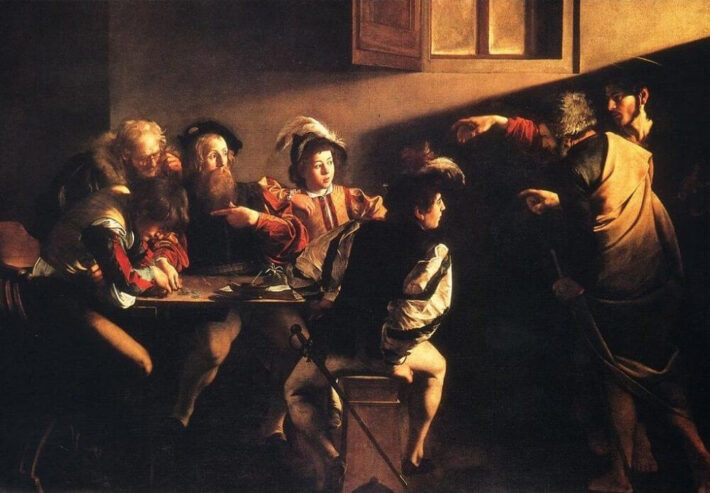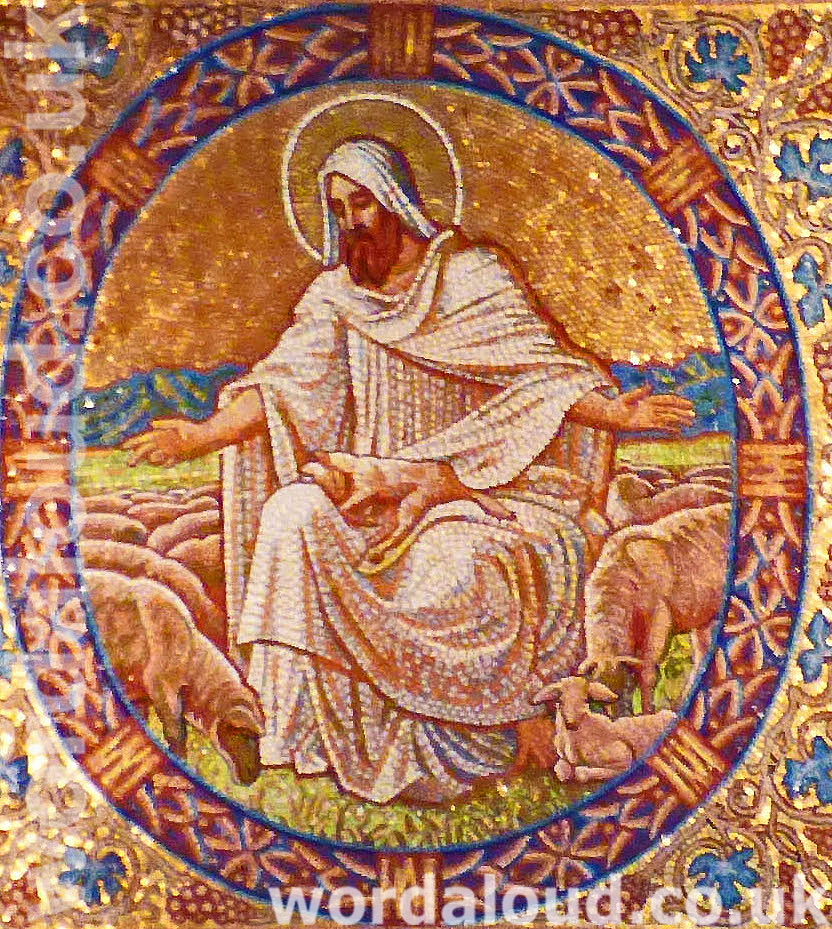Christian Art | The Calling Of Saint Matthew by Caravaggio
Luke 5: 27-32 – Saturday after Ash Wednesday (Audio Bible, Spoken Word)
27 ¶ And after these things he went forth, and saw a publican, named Levi, sitting at the receipt of custom: and he said unto him, Follow me.
28 And he left all, rose up, and followed him.
29 And Levi made him a great feast in his own house: and there was a great company of publicans and of others that sat down with them.
30 But their scribes and Pharisees murmured against his disciples, saying, Why do ye eat and drink with publicans and sinners?
31 And Jesus answering said unto them, They that are whole need not a physician; but they that are sick.
32 I came not to call the righteous, but sinners to repentance.
It was a sin for Levi to collect taxes for the occupying Roman power. His company would be anathema to the Jews. In calling Levi, in giving him a vocation, Jesus is calling a sinner to leave behind his former self to follow him.
Levi’s joy at Christ’s call demands a great celebration. With great generosity of spirit, he invites Christ to share in a banquet. His vocation and rebirth, as he renounces the sins of his past, are not a cause for any sadness or long faces, but rather for giving and sharing, publicly expressing his conversion to Christ.
At the banquet, a large company of tax collectors (publicans) and sinners are gathered, and once again we hear the Pharisees and scribes speak against Jesus and his disciples: What on earth are they doing with people like this? And so Jesus replies: ‘I came not to call the righteous, but sinners to repentance.’ The gift of Jesus’ incarnation overwhelms the Jewish practice and the old law. We are all sinners. None of us is perfect. Christ’s call is to us all, to accept the vocation he offers us, to save us all.
We think then of how, as St Paul states, salvation is not to be found in the old law of Moses, only in Christ. We are saved through simplicity of faith in Christ, by approaching Christ acknowledging that we are sinners. There is no time for the cold, legalistic calculations of the scribes; only through a cheerful self-surrender to Jesus will we be saved.
‘When he told us to follow him, it was not that he needed our service but that he wanted to bestow salvation upon us. To follow the Saviour is to share in salvation; and to follow the light is to perceive the light. Those who are in the light do not themselves cause the light but rather they are lit up by it. They do not help the light but they are helped and illuminated by it.’ St Irenaeus
![]()

Audio Bible KJV | Endnotes
How and why did Jesus eat with sinners?
The event challenges our assumptions about who is worthy of God’s love and forgiveness and reminds us of Jesus’ radical message of inclusivity and compassion.
The act of sharing a meal together in Jewish tradition was a significant one, symbolizing fellowship and mutual acceptance. However, in Jesus’ time, sharing a meal with certain individuals could also be seen as a scandalous and socially unacceptable act. Religious leaders criticized Jesus for eating with tax collectors (‘publicans’ – KJV), prostitutes, and other ‘sinners’, seeing such behaviour as a violation of the purity laws and a betrayal of Jewish tradition.
Jesus’ actions in these instances were deliberate and purposeful, revealing his message of love and acceptance for all. His willingness to dine with those who were considered outcasts and unclean challenged the religious and societal norms of his day and demonstrated his commitment to embodying God’s love and mercy.
The scene of Jesus eating with sinners connects to key themes in Christianity. Jesus’ association with ‘sinners’ echoes the Parable of the Prodigal Son, in which the father forgives and celebrates the return of his wayward son, even though he has squandered his inheritance and brought shame upon his family. This parable highlights the transformative power of repentance and forgiveness and emphasizes the importance of extending grace and mercy to those who have gone astray.
Likewise, the scene of Jesus eating with sinners is a powerful reminder of the centrality of the Christian message of salvation. Through his death and resurrection, Jesus offers the possibility of redemption and reconciliation for all who believe in him, regardless of their past actions or social status. As the bridegroom of a new covenant, Jesus extends a loving invitation to all to partake in the feast of God’s kingdom, regardless of their past mistakes or failures.
Jesus eating with sinners challenges our assumptions about who is deserving of God’s love and forgiveness and reminds us of the radical inclusivity and compassion of Jesus’ message. By sharing meals with tax collectors, prostitutes, and other ‘sinners’, Jesus demonstrates his commitment to embodying God’s love and mercy and revealed the transformative power of repentance and forgiveness. As followers of Jesus, we are called to extend this same grace and mercy to others and to welcome all into the loving embrace of God’s kingdom.








